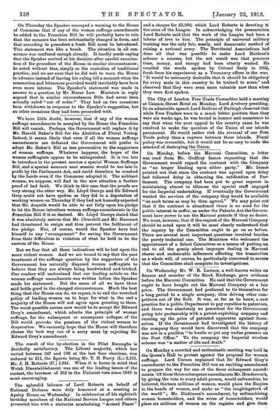We have little doubt, however, that if any of the
woman suffrage amendments be accepted by the House the Franchise Bill will vanish. Perhaps the Government will replace it by Mr. Harold Baker's Bill for the Abolition of Plural Voting. Indeed, it seems likely that even if all the woman suffrage amendments are defeated the Government will prefer to adopt Mr. Baker's Bill as less provocative to the supporters of woman suffrage. Whatever happens, the hopes of the women suffragists appear to be extinguished. It is too late to introduce in the present session a special Woman Suffrage Bill, and a special measure next session would be too late to profit by the Parliament Act, and could therefore be crushed by the Lords even if the Commons adopted it. The militant women, we suppose, will find in the new situation a further proof of bad faith. We think in this case that the proofs are very strong the other way. Mr. Lloyd George and Sir Edward Grey could not have spoken as they did to a deputation of working women on Thursday if they had not honestly expected that Mr. Asquith would be able to act fully upon his pledge to let the House introduce woman suffrage amendments in the Franchise Bill if it so desired. Mr. Lloyd George stated that it was absolutely untrue that Mr. Churchill and Mr. Harcourt Lad threatened to resign and thus prevent the fulfilment of the pledge. Nor, of course, would the Speaker have lent himself to any "arrangement" for saving the Government from their difficulties in violation of what he held to be the custom of the House.


























































 Previous page
Previous page